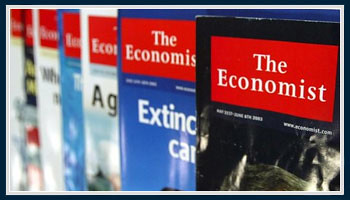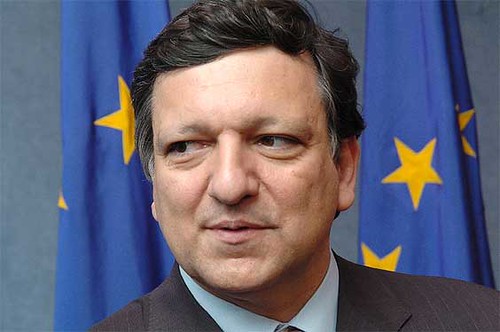 I’ve been rather busy this week, so have only just realised that The Economist’s superb EU-focussed blog Certain Ideas of Europe is – for reasons unknown – being cancelled.
I’ve been rather busy this week, so have only just realised that The Economist’s superb EU-focussed blog Certain Ideas of Europe is – for reasons unknown – being cancelled.
Public Affairs 2.0 asks a few questions. Has the writer left? I doubt it – I’m pretty certain it was produced by more than one staffer. Has The Economist given up on blogs? Well, it doesn’t seem to be cancelling its other blogs – Free Exchange, Democracy in America, Gulliver or The World in 2009.
So, is it that The Economist has run out of ideas on Europe, as Public Affairs 2.0 asks, or is it something else? With the Summer’s European Parliamentary elections fast approaching, with Ireland likely to hold another referendum on the Lisbon Treaty, with the European Commission soon to change over, surely interest in EU affairs is likely to rise? Surely now, more than ever, is the time that regular daily analysis of EU affairs is vital?
Well, yes. But The Economist is a business, not a public service organisation. I for one would be astounded if Certain Ideas of Europe ever got anywhere near the traffic of the other Economist blogs – not due to any lack of quality (I often used to cite it as one of the best), but purely thanks to the subject-matter. Producing any kind of commercial publication – even a blog – about the EU simply will not make you much cash. Unless, that is, you target the obsessives. And that, generally speaking, means targeting the eurosceptics. Certain Ideas of Europe, aiming for balanced and restrained coverage, simply wasn’t angry or sensational enough to draw in the crowds.
EU affairs remain a specialist interest. Providing free information is not worthwhile, because there are so few people who care. This is why The Economist’s EU-focussed spin-off European Voice keeps so much of its content locked behind a subscription wall. By my calculations, I get a similar monthly readership to the print version of the European Voice (based on their paid-for sales – more likely to be read than the vast number of comp copies they put out). And that’s in a month when I’ve not been posting much.
Of course, the way European Voice survives is the complimentary copies that make up a good 89% of its 18,500 print run. Because as these are sent to so many EU bigwigs, free of charge, it enables the European Voice sales team to claim that 7,398 individuals in the European Commission, 505 in the European Parliament and 433 in the Council of Ministers are subscribers. “Ooooh!”, think the advertisers, “that means we can get our message in front of people who really matter!” It’s the same loss-leading advertising strategy used by fellow EU news weekly The Parliament Magazine, as well as UK-centred ones like The House Magazine and Total Politics, among others.
It’s a perfectly valid ad sales technique, and been going on for years. As long as you’ve got a decent sales team, you can pull it off. It doesn’t matter whether every single one of those complimentary copies is put in the recycling bin by some beleaguered secretary as soon as they arrive without even entering the same room as the political bigwig whose name is on the subscriber list – the fact that it *might* be read by them is usually enough for the advertisers.
Not so online. Online, statistics can be padded (using visitors rather than unique visitors, page loads rather than visitors, hits rather than page loads, etc.), but they are much harder to bluff completely. If an advertiser asks outright how many people visit your website and you give them low number, why would they bother advertising with you? You can’t possibly get away with “well, we may only get 200 visitors a day, but every single one of them is really important, honest” in the same way that you can with print.
What does this all mean? Well, by the European Voice’s own media pack’s figures (warning – PDF), fewer than 2,000 people a week are willing to pay money for that publication. That’s significantly less than most paid-for local newspapers in the UK. It could never survive on subscriptions alone – there simply isn’t enough interest.
Likewise, the lack of interest in EU matters means that online readership would be similarly dire even if they did put all of their content up for free, and this would not be enough to attract any advertising whatsoever. (Case in point – I’ve recently started a BlogActiv mirror for some of the content on this site. Even on days when I’ve been featured as Editor’s Choice on their front page and in the daily EurActiv email bulletins, it’s got less traffic than this place. Both BlogActiv and EurActiv survive off grants and sponsorship, not traditional advertising.)
So the European Voice survives purely through the advertising attracted by all those comp copies to the bigwigs – something almost impossible to pull off with an online-only publication. (Well, I could pull the same trick with this place if I wanted – I’d just have to enter the email addresses of everyone who works in the Commission and EP into my email subscriber list. 99% of them would mark all my emails as spam, but, by the same logic as works with complimentary print publications, who cares? They’re on the list – that’s what matters.)
Certain Ideas of Europe, of course, was online only. Without a print presence, it had no advertising potential – just as most individual blogs have no advertising potential (hence the plethora of blog advertising networks like BlogAds and its imitators that use strength in numbers approaches, grouping dozens of blogs together to offer a combined readership that might be of interest to advertisers).
As a commercial publisher trying to make money, for The Economist to continue publishing a blog about EU affairs evidently does not make any business sense. Because it is all but impossible to make money out of writing about the EU. No one is interested. No one cares. This place is one of the longest-running and better-known English-language EU-centred blogs, and it’s not even in the top 100 UK political blogs by inbound links or readership. And of those top 100 UK political blogs, only about five or six have enough traffic, capital and business know-how behind them to even approach being viable commercial concerns.
Last week media blogger Gary Andrews asked whether the current credit crisis might see local newspapers shift to online only publishing. As I noted in the comments, I can’t see it. Local newspapers may fold as the web removes traditional sources of advertising revenue (largely by offering alternatives to local newspaper small ads for free on sites like Craigslist and its clones) – but without a print presence to give the potential of at least some big buck adverts, I can’t see how special-interest websites (be they local newspapers or EU-centred) will ever be able to generate enough money to survive.
Online ads are still pretty much restricted to banner, skyscraper, MPU and text-based (either links or advertorials), with only a few other options for sound- and video- based sites. None of these have any hope of having as much impact as a full-page newspaper advert, even if they can be seen by many times more people. And for all of them, advertisers are canny enough to demand exact viewing/readership figures – something that will always be impossible for print. And all of this means that online adverts will always be restricted in the amount of revenue they can generate – because most advertising rates are based on little more than what the ad salesperson can get away with. Online, they can get away with far less.
All this, of course, means not just the slow death of proper scrutiny of borough and county councillors as local newspapers begin to die out, but also the continued lack of serious scrutiny of EU-level politics, and the continued lack of that kind of European public sphere or demos we’re always told is a precondition for genuine democracy.
Because if you can’t make money out of publishing something, no commercial publisher with any sense is going to try. This applies to the EU just as it applies to local newspapers or magazines specialising in knitting scarves out of human hair.*
And so it is that we are losing one of the best EU blogs just as we approach a crunch year for EU affairs. Unless you’re like the BBC, and forced to cover events that are deemed “in the public interest” (even though the public remains singularly uninterested), writing about the EU is never going to make you any money. Not until it becomes more interesting to the public at large, at any rate – and there’s no sign of that happening any time soon.
* There are (almost) always business models that will work for special-interest publications – but they will rarely involve much expenditure on either editorial content or publicity, being produced at minimal cost and very, very carefully targeted. There are several magazines devoted solely to alpaca farming, for instance – but when was the last time you saw a copy at a newsagent?
With a minimal editorial team and a skilled couple of ad sales people, it would be possible to turn a decent profit from a magazine devoted to EU affairs – if anyone’s interested in launching one, get in touch. But in the present climate it’d only be possible in one language – two at a push. Try to do a genuinely EU-wide magazine published in several languages? Not a hope in hell that there’d be enough interest to justify the expense of all the translators and language-specific subs. Just as it wouldn’t be worthwhile producing a magazine on alpaca farming with a 20-strong editorial team.


 I’ve been rather busy this week, so have only just realised that The Economist’s superb EU-focussed blog Certain Ideas of Europe is – for reasons unknown –
I’ve been rather busy this week, so have only just realised that The Economist’s superb EU-focussed blog Certain Ideas of Europe is – for reasons unknown –  If there’s one thing absolutely guaranteed to put back the European Union cause in the UK, it’s having some unelected Brussels bureaucrat
If there’s one thing absolutely guaranteed to put back the European Union cause in the UK, it’s having some unelected Brussels bureaucrat 